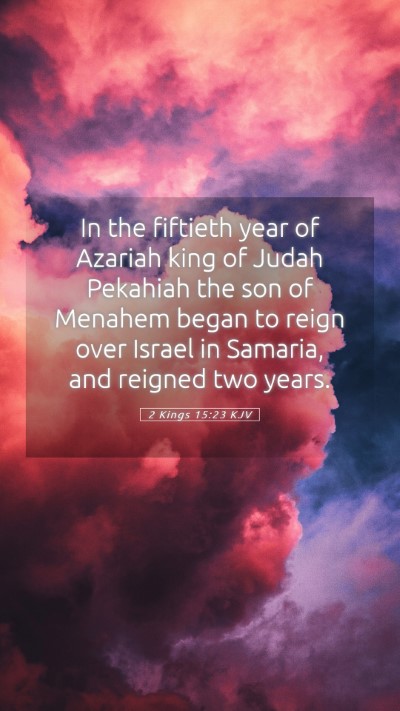Understanding 2 Kings 15:23
Bible Verse: 2 Kings 15:23 - "In the fifteenth year of Amaziah the son of Joash king of Judah, Jeroboam the son of Joash king of Israel began to reign in Samaria, and reigned forty and one years."
Bible Verse Explanations and Meanings
This verse marks a significant point in the history of Israel's monarchy, introducing Jeroboam II, a king whose reign is characterized by both political stability and moral decline.
Significance of Jeroboam II's Reign
According to Matthew Henry, Jeroboam II restored the borders of Israel and provided a period of prosperity, fulfilling God's earlier promises even amid a time of spiritual decline.
Albert Barnes emphasizes that Jeroboam's leadership was impactful in geopolitical terms, as he reclaimed territories lost to enemies, which was critical for national pride and continuity.
Historical Context
This era falls within the divided kingdom of Israel and Judah, where tensions were high, and Idolatry was rampant. The reign of Jeroboam II is considered a paradox as it showed territorial success while moral decay permeated society.
Adam Clarke notes that this was a time when Israel was flourishing materially, yet spiritually, the people's hearts strayed from God, indicating a dangerous disconnect between blessings and faithfulness.
Bible Verse Interpretations
- Divine Sovereignty: This verse illustrates God's control over history, setting leaders in place even among unrighteous people.
- Fulfillment of Prophecy: Jeroboam II's reign is a crucial fulfillment of God's word through the prophets regarding Israel's restoration.
- Moral Reflection: Despite external success, internal moral integrity was lacking, showcasing the complex nature of human governance.
Lessons for Today
This passage invites us to reflect on how material success doesn't equate to spiritual health. The governance of a nation is profoundly affected by the hearts of its people, urging modern readers to consider the spiritual condition in the face of prosperity.
Cross References
- 2 Kings 14:25 - Discusses Jeroboam’s restoration of Israel.
- Amos 6:14 - Prophecies regarding Israel's future and its moral state.
- Hosea 1:2 - Introduces the context of Israel’s unfaithfulness during Jeroboam II’s reign.
Conclusion
In summary, 2 Kings 15:23 serves as a vital historical marker and a moral lesson within the biblical narrative. Understanding this verse requires delving into its historical context and recognizing its implications for both ancient Israel and modern readers. The challenges of balancing prosperity with faithfulness remain a timeless theme.
For those engaging in bible study groups or seeking bible study resources, reflections on this verse can lead to enriched discussions about leadership, divine justice, and personal integrity in times of success.


